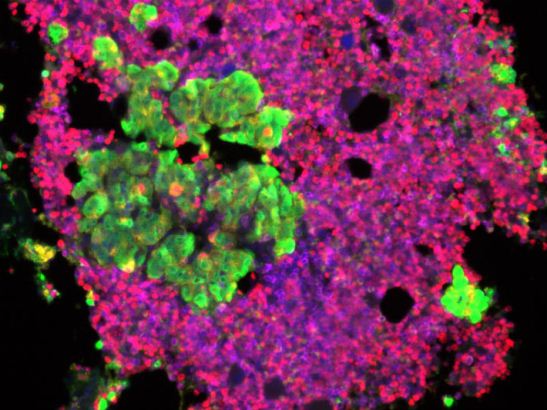.tmb-0874x492.jpg?sfvrsn=82b32469_1)
The preliminary results of a major phase III clinical trial show that the genetically targeted drug olaparib improves outcomes for men with advanced prostate cancer whose tumours have DNA repair faults.
The PROfound trial, led by Professor Johann de Bono, at The Institute of Cancer Research (ICR) and The Royal Marsden NHS Foundation Trust, selected for men who had one of 15 faults in the genes, such as BRCA mutations, involved in a cell’s ability to repair its DNA.
The results showed that men given olaparib, who had genes with these DNA repair faults, lived longer without their cancer coming back than those given the hormone therapy enzalutamide or another targeted treatment, abiraterone.
Olaparib is a genetically targeted treatment that selectively kills cancer cells with faulty DNA repair genes. The new clinical trial follows on from an earlier stage trial that found some 80 per cent of men whose tumours had faults in the BRCA genes responded to olaparib.
Precision medicine
Professor Johann de Bono, Regius Professor of Cancer Research at The Institute of Cancer Research, London, and Consultant Medical Oncologist at The Royal Marsden NHS Foundation Trust, said:
“Our clinical trial is the first to deliver precision medicine to men with advanced prostate cancer. These results showed that olaparib, a treatment that specifically targets cancer cells with faulty DNA repair genes, improved the outcome for men with the most deadly form of the disease.
“It’s enormously rewarding to see more than 15 years of work come to fruition – from our initial findings in the laboratory through to improving the treatment of men suffering from prostate cancer.
“We’re now eagerly awaiting the final analysis of the trial. If the results look as good as these initial data suggest, men with advanced prostate cancer who have BRCA mutations should be able to benefit from olaparib – a tablet which doesn’t have the side effects of chemotherapy – in the next couple of years.”
Olaparib, which is also known by the brand name Lynparza, became the first cancer drug directed against an inherited genetic fault when it licensed by the European Medicines Agency for BRCA-mutant ovarian cancer in December 2014 and more recently for BRCA-mutant breast cancer. The ICR discovered the genetic targeting of olaparib and, together with its clinical partner The Royal Marsden, has played a major role in the drug’s development in clinical trials.
